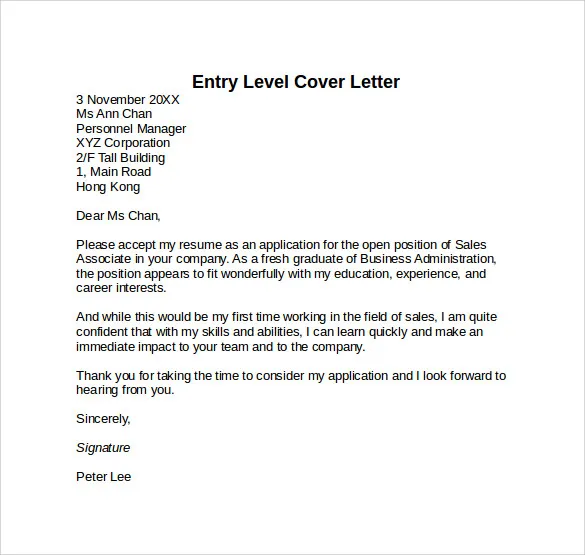Understanding the Importance of a Cover Letter
In the competitive world of job hunting, especially for entry-level positions, a well-crafted cover letter is your secret weapon. It’s more than just a formality; it’s your first opportunity to make a strong impression on a potential employer. A compelling cover letter can significantly increase your chances of getting noticed and securing an interview. It allows you to introduce yourself beyond the confines of your resume, providing a personal touch and showcasing your unique qualifications and enthusiasm for the role.
What is a Cover Letter
A cover letter is a document you send with your resume when applying for a job. It serves as an introduction, allowing you to expand on your skills, experience, and qualifications in a more narrative format than your resume. Think of it as a personalized sales pitch highlighting why you are the perfect fit for the specific position and company. Unlike a resume, which provides a factual overview, a cover letter allows you to express your personality, motivation, and understanding of the job requirements.
Why You Need a Cover Letter
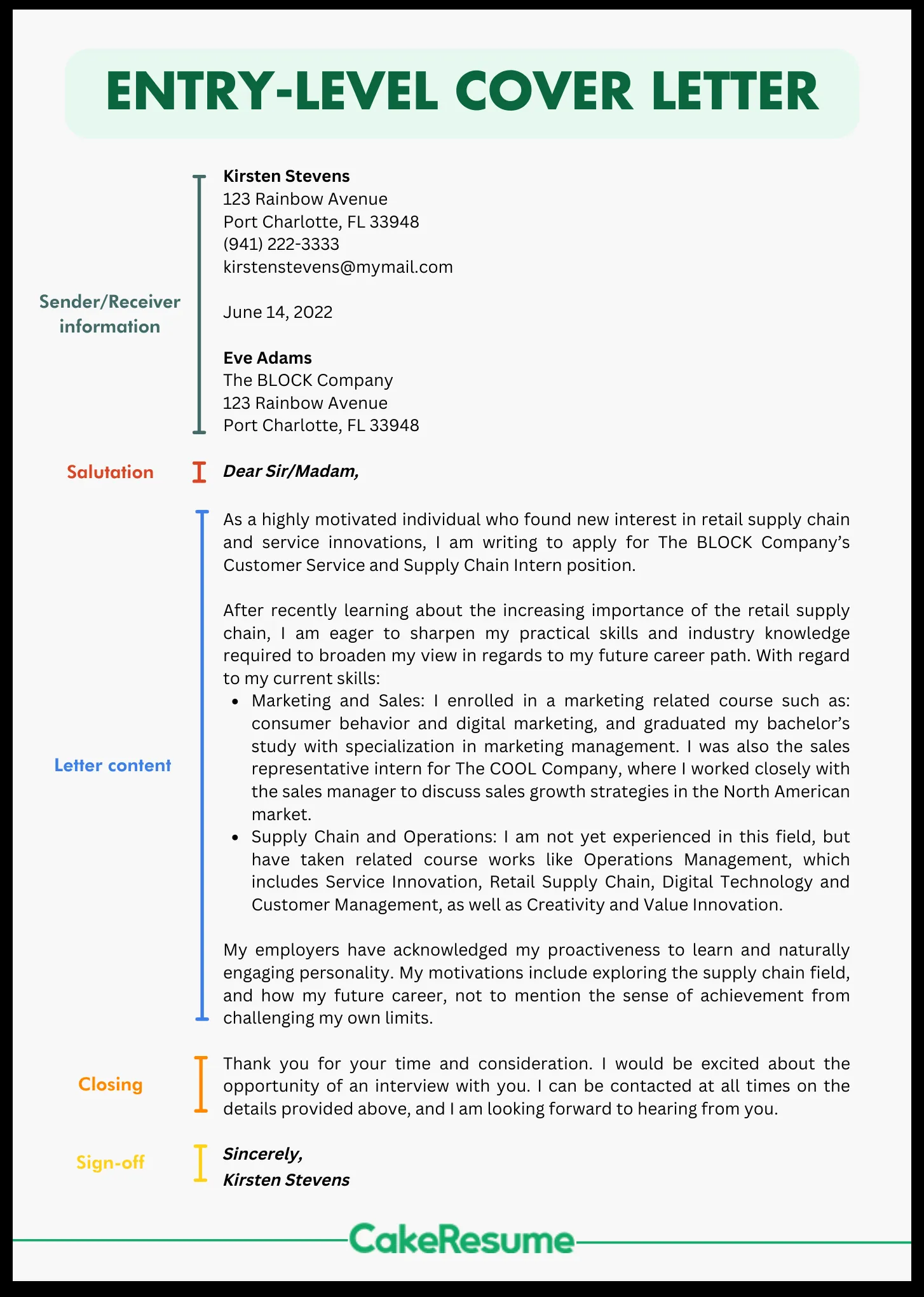
For entry-level positions, where candidates often have limited work experience, a cover letter becomes even more crucial. It provides context for your skills and experiences, demonstrating how your education, internships, volunteer work, or extracurricular activities have prepared you for the role. It’s an opportunity to connect your experiences to the job requirements. A cover letter shows that you’ve taken the time to understand the company and the position, demonstrating your genuine interest and commitment. It can set you apart from other applicants who may only submit a resume.
Key Components of an Entry-Level Cover Letter
A well-structured cover letter follows a standard format, although the content will vary based on the specific job and your qualifications. The essential components include a header with your contact information, a professional greeting, a compelling opening, a body that highlights your relevant skills and experiences, and a strong closing with a call to action. Each section should be carefully crafted to present you in the best possible light and demonstrate your suitability for the role.
Header and Contact Information
Your header should include your full name, address, phone number, and email address. Ensure that your email address is professional. If applying online, it’s acceptable to place this information at the top of the cover letter. Also include the date and the hiring manager’s name and title if you know it, along with the company’s address. If you don’t know the hiring manager’s name, research or use a general greeting, which is preferable to misspelling a name.
Professional Formatting
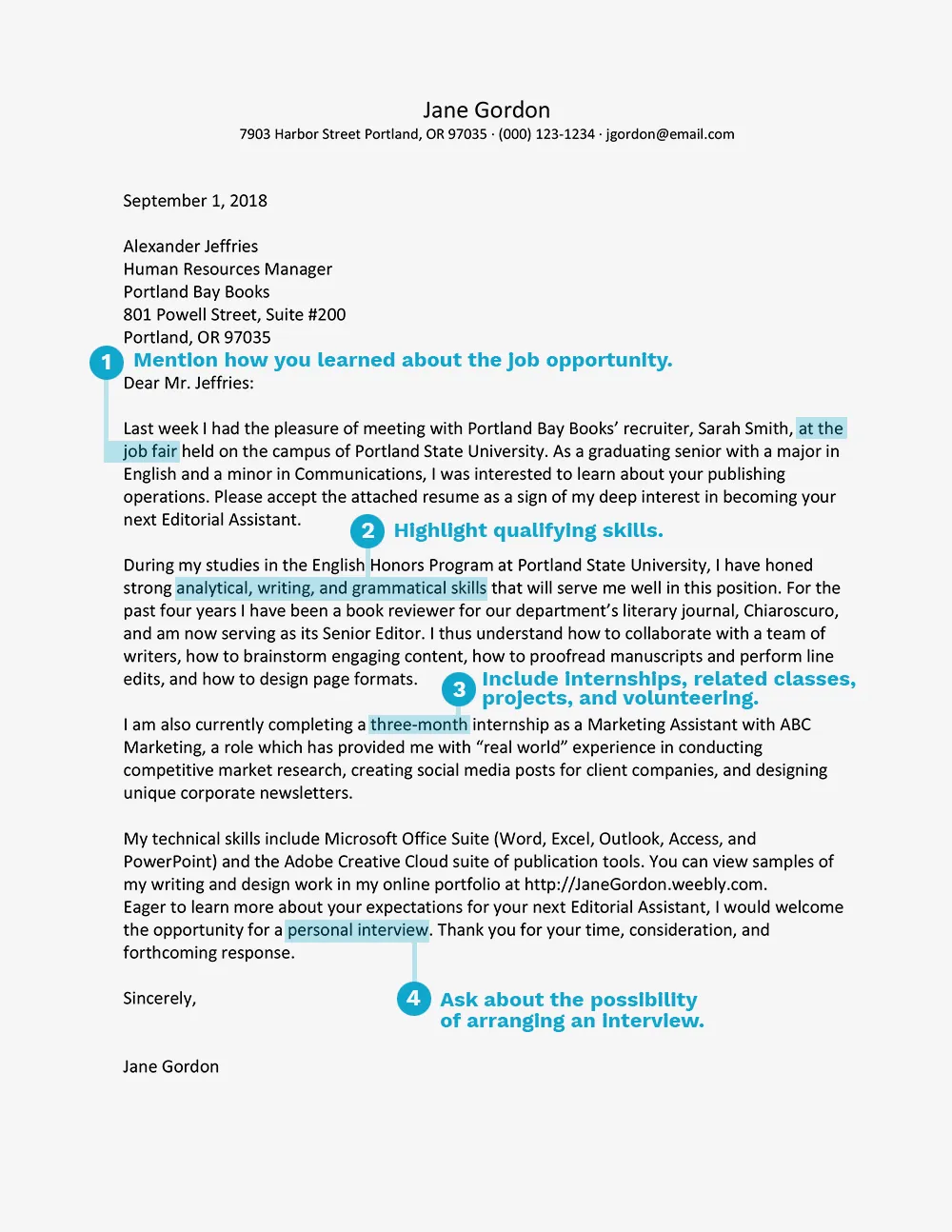
Maintain a clean and professional format. Use a standard font like Times New Roman, Arial, or Calibri, and keep the font size between 10 and 12 points. Use single spacing within paragraphs and double spacing between paragraphs. Ensure consistent margins (typically 1 inch on all sides) and justify the text to the left. The overall look should be easy to read and visually appealing, conveying professionalism from the outset. This will also help the hiring manager quickly find the information they need.
Greeting the Hiring Manager
Address the hiring manager by name whenever possible. Research the company’s website or LinkedIn to find out who the hiring manager is. A personalized greeting shows that you’ve taken the time to learn about the company and the role. If you can’t find a specific name, use a professional greeting such as “Dear Hiring Manager” or “Dear [Department Name] Team.” Avoid generic greetings like “To Whom It May Concern.” Showing that you care is crucial to make your application stand out.
Writing a Compelling Opening
Your opening paragraph should immediately grab the reader’s attention. State the position you are applying for and how you learned about it. Briefly mention why you are interested in the role and the company. Consider starting with a compelling statement that showcases your passion, enthusiasm, or a relevant skill. Avoid generic openings like “I am writing to apply for the position of…” Instead, try something that reflects your understanding of the company or the job’s challenges.
Highlighting Relevant Skills and Experiences
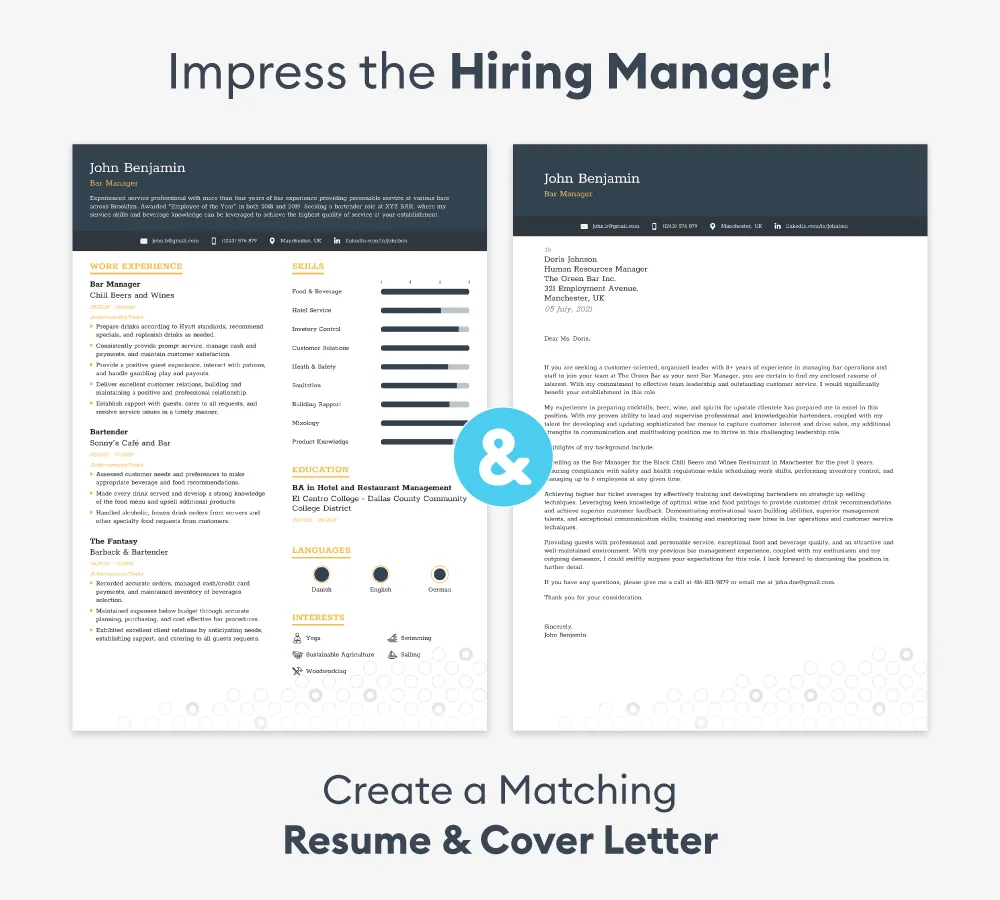
In the body of your cover letter, elaborate on your skills and experiences, focusing on those that are most relevant to the job description. Provide specific examples of how you have demonstrated these skills. Use action verbs to describe your accomplishments and responsibilities. Whenever possible, quantify your achievements to show the impact of your work. This is where you bridge the gap between your resume and the specific requirements of the job.
Showcasing Your Education
For entry-level positions, your education is often a significant factor. Highlight your degree, major, and any relevant coursework. Mention any academic achievements, such as honors, awards, or relevant projects. If you have a high GPA, consider including it. Also, include any research projects, thesis topics, or extracurricular activities that demonstrate your knowledge and skills. If you are still in school, indicate your expected graduation date.
Quantifying Your Achievements
Whenever possible, quantify your achievements to demonstrate the impact of your work. Instead of saying “I improved customer service,” say “I improved customer satisfaction scores by 15% through implementing a new training program.” Numbers add credibility and make your accomplishments more tangible. This can involve metrics from previous jobs, internships, volunteer work, or academic projects. Quantifying your achievements will help to make your application stand out.
Expressing Enthusiasm and Interest
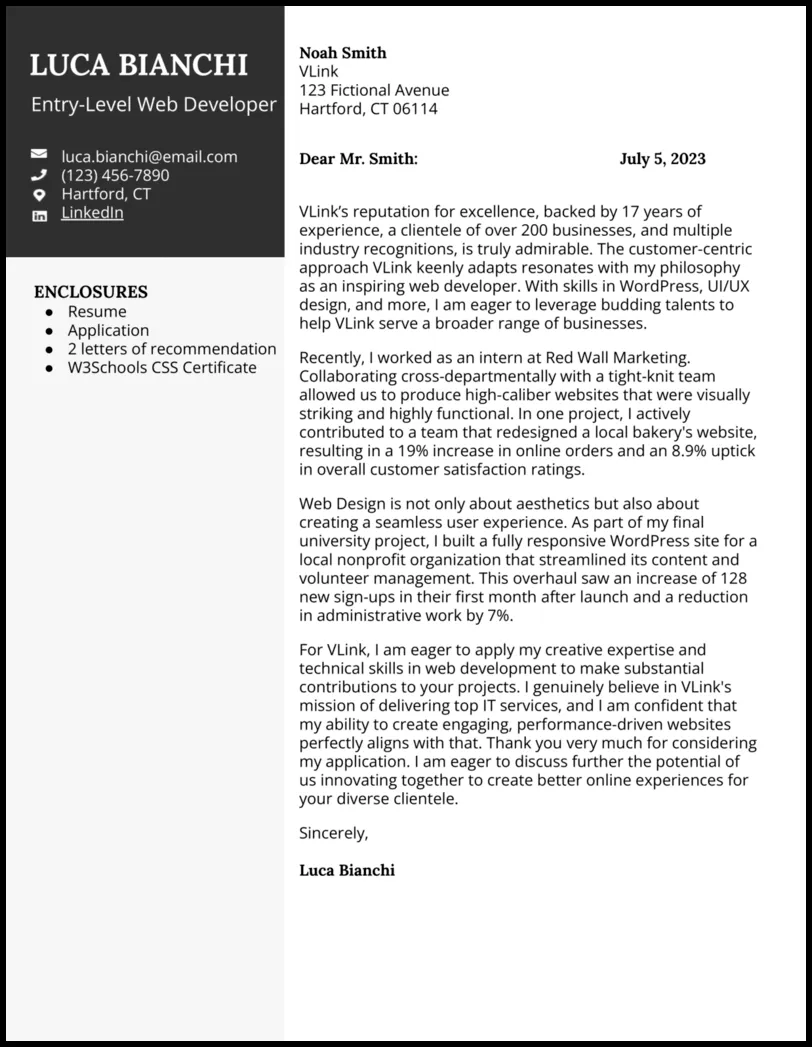
Throughout your cover letter, express your genuine enthusiasm for the role and the company. Show that you have researched the company and understand its mission, values, and culture. Explain why you are excited about the opportunity to contribute to their team. Your enthusiasm can make a strong impression, demonstrating your eagerness to learn and grow in the role. This will ensure that the hiring manager takes a look at your application.
Formatting the Body of the Letter
Structure the body of your cover letter logically. Use clear and concise paragraphs, each addressing a specific point. Aim for a length of three to five paragraphs. Start with an introduction that states your purpose, then discuss your skills, experiences, and qualifications. In the next paragraph, provide examples that support your claims. Conclude by expressing your interest in the position and reiterating your value. Ensure your thoughts are clear and easily readable.
The Importance of Proofreading
Proofreading is crucial. Typos, grammatical errors, and formatting mistakes can undermine your credibility and give the impression that you lack attention to detail. Always proofread your cover letter carefully before submitting it. Use spell-check and grammar-check tools, but also read through the letter manually. Consider asking a friend, family member, or career counselor to review your letter for errors. A polished cover letter is a sign of professionalism and can significantly boost your chances.
Closing Your Cover Letter
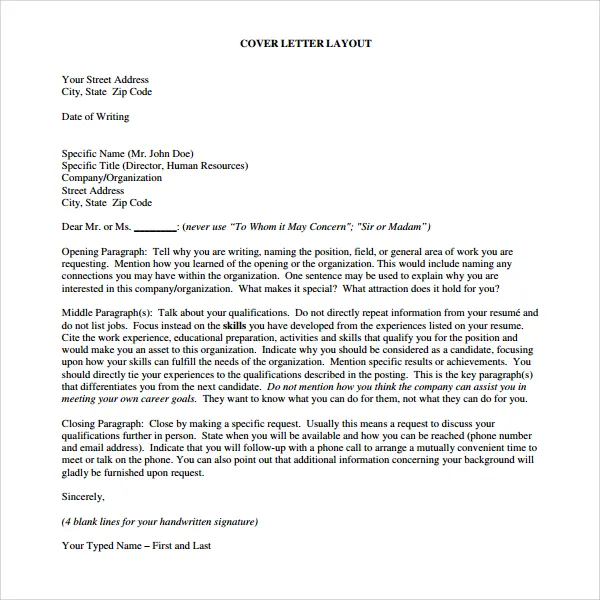
Your closing paragraph should reiterate your interest in the position and thank the reader for their time and consideration. Express your eagerness to discuss your qualifications further and make it clear that you are available for an interview. Make sure you use a professional closing, such as “Sincerely,” “Respectfully,” or “Best regards.” A strong closing leaves a positive final impression.
Writing a Strong Call to Action
Include a call to action in your closing paragraph. This is a statement that encourages the hiring manager to take the next step. For instance, you can say, “I am eager to discuss my qualifications further and am available for an interview at your earliest convenience.” Or, “I am excited about the opportunity to contribute to [Company Name] and look forward to hearing from you soon.” This shows that you are proactive and enthusiastic about the opportunity.
Thanking the Reader
Always thank the reader for their time and consideration. This is a sign of courtesy and professionalism. A simple statement like, “Thank you for considering my application,” is sufficient. Expressing gratitude shows that you value the reader’s time and respect their decision-making process. Proper etiquette will show the hiring manager that you are serious about the position.
Proofreading and Editing
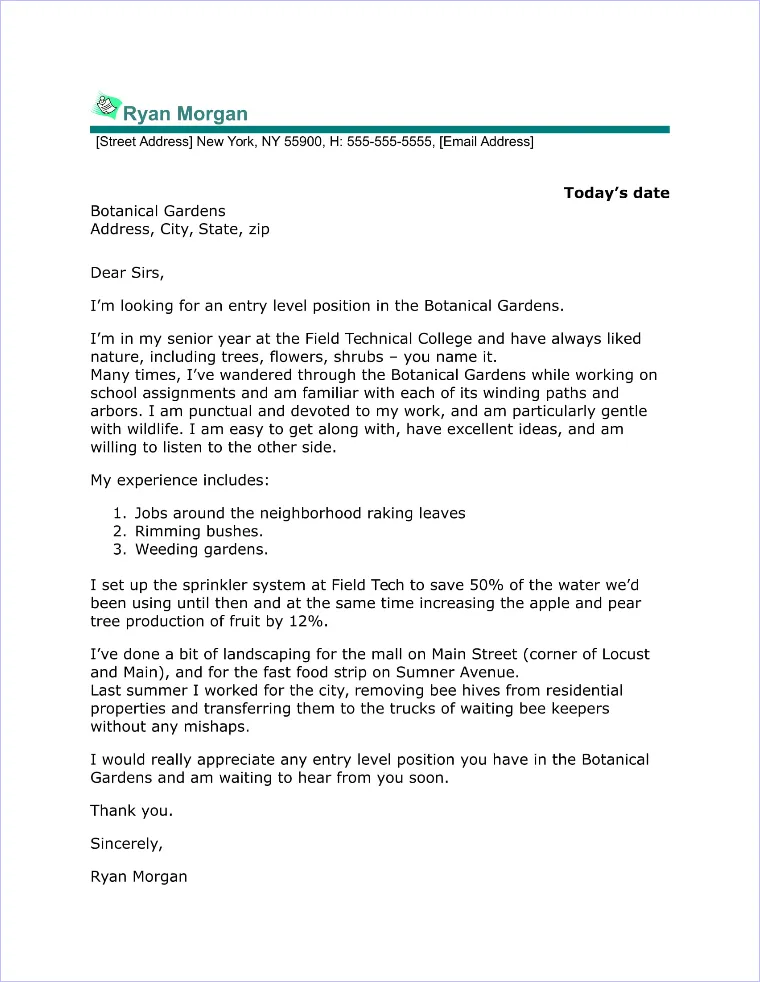
Before submitting your cover letter, proofread it carefully. Check for spelling mistakes, grammatical errors, and formatting inconsistencies. Read the letter aloud to catch any awkward phrasing or sentence structure issues. Consider asking a friend, family member, or career counselor to review it. A polished cover letter demonstrates your attention to detail and professionalism, leaving a positive impression on the hiring manager.
Cover Letter Examples for Entry-Level Positions
Reviewing sample cover letters for entry-level positions can provide valuable insights. Look for examples in your field or industry to understand how to tailor your letter. Analyze how other candidates highlight their skills and experiences. Use these examples as inspiration and adapt them to reflect your unique qualifications and experiences. Remember that your cover letter is a personal document that reflects your individual skills.
Example Cover Letter 1 Marketing
A marketing cover letter should emphasize your understanding of marketing principles, your creativity, and your ability to drive results. Highlight any relevant internships, projects, or coursework that showcase your marketing skills. Mention your experience with social media, content creation, or data analysis. Quantify your achievements whenever possible, such as “increased social media engagement by 20%.” Show your understanding of their current marketing efforts and express your interest in contributing to the team’s success. This will make your letter stand out.
Example Cover Letter 2 Software Engineering
A software engineering cover letter should focus on your technical skills, coding experience, and problem-solving abilities. Highlight any programming languages, software, or tools you are proficient in. Mention any relevant projects, such as personal coding projects or contributions to open-source projects. Showcase your experience with software development methodologies, such as Agile. Include your ability to solve technical challenges. This will help to demonstrate that you have the right skills.
Tailoring Your Cover Letter
Always tailor your cover letter to each specific job application. Review the job description carefully and identify the key requirements. Customize your letter to match the skills and experiences the employer is seeking. Highlight the aspects of your background that are most relevant to the position. Tailoring your letter demonstrates that you have taken the time to understand the job requirements and are genuinely interested in the role and the company.
Researching the Company
Before writing your cover letter, research the company. Visit their website, read their mission statement, and explore their social media presence. Learn about their products, services, and culture. This will help you to tailor your cover letter to the company’s specific needs and show that you are genuinely interested in working there. Demonstrating that you understand their business will greatly impress the hiring manager.
Matching Skills and Requirements
Carefully review the job description and match your skills and experiences to the required qualifications. Identify the keywords and phrases used in the job posting and incorporate them into your cover letter. Highlight the skills and experiences that align with the job requirements. By emphasizing these elements, you demonstrate that you are a good fit for the role. Make sure your skills match the ones in the job posting.
Common Mistakes to Avoid
Avoid common mistakes that can detract from your application. Don’t use generic cover letters, as they appear impersonal. Avoid typos and grammatical errors, as they indicate a lack of attention to detail. Avoid overly formal language, as it can make you seem distant. Don’t focus solely on your needs. Instead, emphasize what you can offer the employer. A professional cover letter will help you gain a competitive advantage.
Generic Cover Letters
Avoid using generic cover letters that are not tailored to the specific job or company. Generic cover letters lack the personal touch and fail to demonstrate your genuine interest. Tailor your cover letter to each job application, highlighting relevant skills and experiences and showing that you understand the company. Generic cover letters suggest a lack of care and attention to detail, and are less likely to get you an interview.
Typos and Grammatical Errors
Typos and grammatical errors can damage your credibility and professionalism. Proofread your cover letter carefully before submitting it. Use spell-check and grammar-check tools, but also read through the letter manually. Ask a friend, family member, or career counselor to review it for any errors. A polished cover letter indicates that you care about the details and is more likely to get you an interview.
Overly Formal Language
Avoid overly formal language. While professionalism is essential, a stiff or impersonal tone can make you seem distant. Write in a clear, concise, and engaging style. Express your personality and enthusiasm for the role and the company. A conversational tone helps the reader connect with you and demonstrates that you are a good fit for the company culture.
